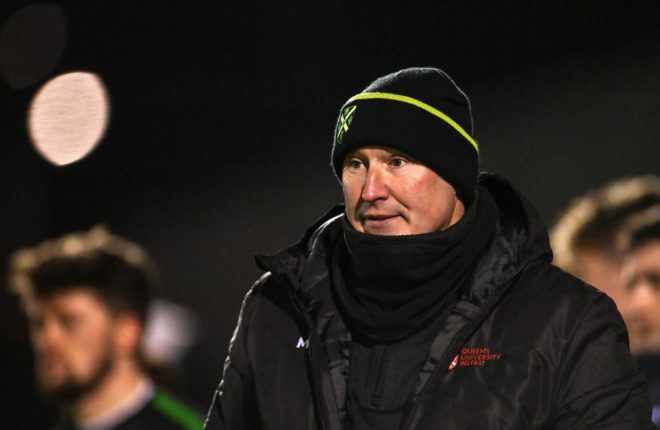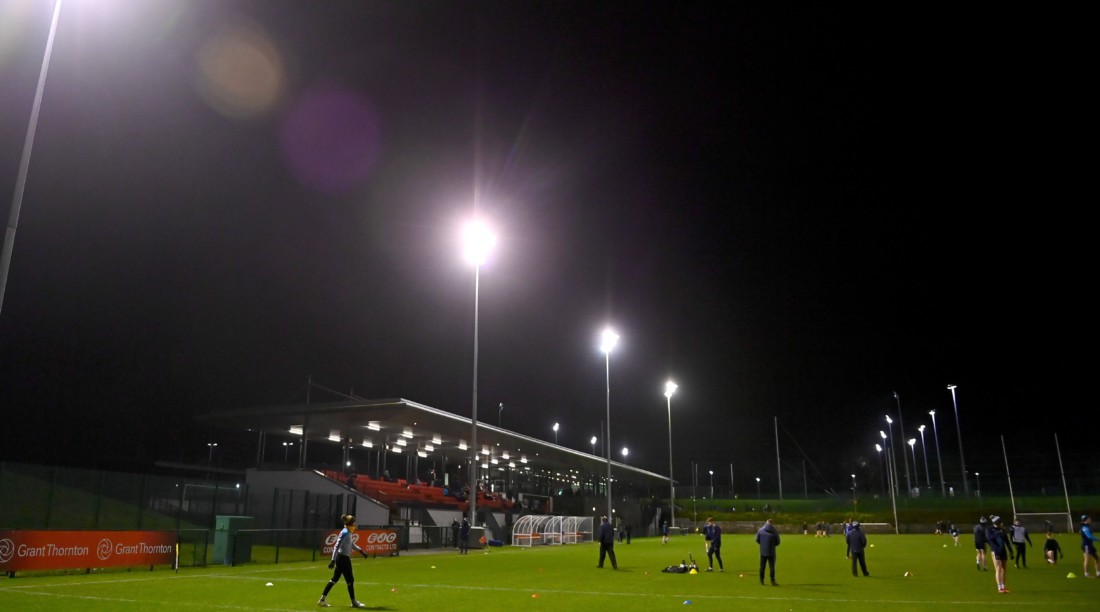There has been the annual debate of Sigerson Cup has crossing paths with the start of the NFL. Michael McMullan sought the Queen’s, St Mary’s and Ulster University managers’ thoughts on the future of Third Level football’s showpiece competition….
Barry Dillon (Ulster University)
IN Dillon’s book, Sigerson and National League simply cannot overlap and having only eight teams left by the turn of the New Year would help ease the congestion.
His proposed new format – linked to the Ryan Cup (league competition) – would see up to nine games played in the first semester of the university year.
The Ryan Cup group stages – four sections of four – would determine the seeding for a similar Sigerson Cup group format before going into Ryan Cup quarter-finals onwards to be played to a conclusion by the end of November.
Teams placed first, second, third and fourth after the Ryan Cup group stages, would be placed in separate bowls for the Sigerson Cup draw with one top team from the Ryan Cup in each of the four Sigerson Cup groups and so on.
Three Sigerson group games would be played in December, with the top two in each group going through to the quarter-finals.
Dillon feels there would be room for nine games before Christmas, stressing the need for Third Level GAA to stretch across two semesters.
“You can’t get the same kudos for the university if you are only going for one semester,” he said.
Then it’s a case of needing three days in January to run off the knock-out stages before the start of the National League.
“It gets young administrators lined up as well as footballers, so it is a big imprint for the GAA,” he said of the university game.
“If you take all the universities across Ireland, then you are asking for big bother if you have a semester with nothing on.”
Playing the games before Christmas is something St Mary’s manager Gavin McGill wouldn’t see as viable due to exams and students’ part time work.
Dillon outlined how his relationship with inter-county managers was easier before the inter-county season moved in the National League stage. A former Derry selector himself, he can understand how the demands have ramped up with a more condensed inter-county season where contesting for the Sam Maguire Cup depends on league progress.
“With the best will in the world, you have two sides trying to do the best for each other, it just causes unnecessary hassle and overlap,” he said of the clash between the Sigerson Cup and the National League.
“You can get through the McKenna Cup no bother. Group stages of Sigerson in December then straight into the quarter-finals in January could allow a week or two of a break until the National League starts. It’s a lot easier to sell to county managers than rounds of qualifiers and a back door.
“All the players want to play in the Sigerson and that’s a fact,” Dillon adds, outlining how it is an extension of school football.
In a Gaelic Life survey from this season’s submitted 16 Sigerson Cup squads, 54 players were county champions at senior, intermediate or junior level with their club. Maigh Cuilinn, with six players, had the biggest representation. Dillon accepts that club players will stay with their clubs until they are knocked out.
“It is not a big demand,” he summed up of the university scene. “There is no burnout with Sigerson (training) but there is a double up on games.
“Let the McKenna Cup and these (pre-season) competitions continue, but college players in the quarter-final or semi-final or final of a Sigerson aren’t being played, it’s simple,” Dillon sums up of his plans.
“It’s only two weeks; it’s not the end of the world. It is treated differently down south, it’s a culture, you see in Cork and Kerry with Billy Morgan (in UCC) they give them all to the college team. They are getting the best foundation for football and battle hardened, so they come out better players,” Dillon added, pointing to the correlation between Sigerson Cup success and counties staying at the cutting edge of the All-Ireland series.
Gavin McGilly (St Mary’s University College)
ST Mary’s are the only Ulster side to have won the Sigerson Cup in the last decade. Current manager Gavin McGilly, part of Paddy Tally’s winning management team in 2017 and a selector with Down, has a similar outlook to Barry Dillon in understanding the need for county teams to hit the ground running in a NFL that now has more at stake.
McGilly’s concern for the Sigerson Cup is that, in its current back door format and placing in the calendar, could turn into a competition without county players.
He feels that both counties and colleges must concede ground to preserve the competition and leave a situation where players can play for both teams.
“I would definitely an advocate of the straight knock-out format and that would take away two rounds that don’t need to be there in terms of the back door,” he said of a reduction to the Sigerson Cup.
“The fact that it is (currently) running through the National League, it (knock-out) would relieve some pressure straight away…I think it has to be that way.”
McGilly’s proposal differs from Dillon’s in that there are no group stages to the Sigerson Cup with all four knock-out games coming after Christmas with the National League moving back until the first weekend in February.
Should there be a preliminary round needed, possibly to accommodate the previous year’s Trench Cup winners, it would take place before Christmas to ensure an even 16 teams for the knock-out stages in January.
An open Sigerson draw would see the first team drawn out played at home with the addition of all four Ryan Cup semi-finals guaranteed a home game and exempt from any preliminary round.

RANCH THOUGHTS…St Mary’s manager Gavin McGilly wants the Ryan Cup to be absent of relegation
McGilly suggests having the Ryan Cup in the first semester, as it is, with colleges playing whatever players are available after their club seasons. He uses MTU Kerry as a reason why there should be no relegation from Sigerson on the back of the Ryan Cup.
“They could’ve had players away with clubs and you can hit a couple of bad nights and you lose your Sigerson status,” he said of the relegation play-offs while adding that the Kerry college will be too strong for next season’s Trench Cup.
Based on the 2023 calendar, McGilly suggests the Sigerson last 16 games taking place on Wednesday, January 11 with quarter-finals and semi-finals played on the following weeks with the final played on the weekend after the midweek semi-finals.
“If you think a few weekends ago, it was a free weekend with no (inter-county football) activity, that’s where the final should take place,” he suggests, with Barry Dillon also stating that Sigerson – as a national final – requires a weekend date.
“The one thing that might throw a spanner in the works is the weather. If you allow for that, you can still run it off in four weeks,” McGilly added.
With giving up the current back door element of the Sigerson, he feels the inter-county season should meet their end of the compromise with a one week delay until a NFL start in the first weekend in February.
“It would mean the whole of January free and you could still run off the pre-season competitions like the McKenna Cup,” McGilly continued.
“For Sigerson to retain its prestige the colleges need access to county players for the Sigerson games, so they are not playing on a Sunday, then a Wednesday and back on a Sunday again, so you don’t have three games in seven days.
“If there was a bit of give from both ends (college and county) it could work and with elimination, you have half your (Sigerson) teams knocked out every week in terms of players being available for the county teams.”
The other aspect McGilly feels needs brought is a ruling “through negotiations” that players on a Sigerson panel are “not eligible” for any pre-season competitions such as the McKenna Cup.
“That should be the way of it,” he added. “Something has to give or you are going to end up with a situation, and it is getting dangerously close, that if it stays in the current window and current format it will go to a non-inter-county competition.”
He used the example of Matthew Costello and Shane Walsh being absent from Meath’s team last weekend, Rob Finnerty of Galway picking up and injury and Cork’s Cathail O’Mahony now facing time on the sideline as a reason for the need for Sigerson and inter-county’s paths not to cross.
“I can see the frustration from the counties but there needs to be a bit of give. Cork (UCC) had to play six games to win the Sigerson this year…now you would have it down to four,” said McGilly, who agrees that counties are under “huge pressure”.
“The Sigerson Cup has maintained its prestige over the years because of the involvement of county players, bright young players coming on the scene. That has been their environment and arena to put their hand up,” he adds.
“They will train away with their counties; you’re not looking for exclusivity. It’s so they are not being asked to do what they are doing at the minute…playing for everybody. There are the cases of extra-time and penalties before going out three days later for senior inter-county.”
McGilly – like Barry Dillon – highlighted the impact Ulster Sigerson success in the early nineties had for county teams, with their 2017 winning team supplying a host of players to Tyrone’s latest team to bring Sam into Ulster.
“You can hope there is some sort of accommodation that can be reached to make sure (Sigerson) it keeps its prestige. We value it in the college and we feel it is a big part of university life,” he concludes.
“There is the opportunity to make the Sigerson panel and get exposed to good training and all that goes with it, so they can take it back to their clubs.
“You are developing leadership skills then and you hope they can take the good habits back with them, that and only be a good thing.”
Conor Deegan (Queen’s University)
QUEEN’S manager Conor Deegan feels that back door, straight knock-out and even a weekend format for Sigerson are all “viable” options.
While he suggests colleges come together with a united front to see the best window in the calendar for the Sigerson Cup, he feels county teams have to buy into any plans going forward.
“How the counties react to players with the colleges has a determining factor on what you can do or what should be done or what is the best for everybody,” said Deegan, who “loves” his involvement with Queen’s and the club environment they strive to generate.
He feels that the GAA hierarchy must curtail inter-county training before any agreed date in the calendar and players in the Sigerson environment have the chance to develop their game when playing against their peers from other counties.
“The southern counties allow better access,” Deegan feels, having chatted to DCU boss Paddy Christie after their game earlier this season.
“For me, that is one of the bigger questions because it determines what you can and can’t do. You could only do straight knock-out if you had all your players through the Ryan Cup and then into Sigerson.
“That would be the fair way if it was knock-out…there is no other way around it.”
Deegan feels it would be “very harsh” to have just one game after not having access to a full squad to build a team.
“You are playing games for the sake of playing,” he added, while pointing out that the only other option the Sigerson Cup could take wouldn’t have county players, the outcome Gavin McGilly fears for.
Deegan remembers coming to watch Sigerson football at Queen’s when it was in the weekend format with players like Maurice Fitzgerald in their pomp.

NEEDING A BALANCE…Former All-Ireland winner Conor Deegan is in charge of Queen’s and wants inter-county players to have space for Sigerson preparation
“I can see the benefits of how it used to be, it was a spectacle,” he said of a weekend competition a number of his Down teammates excelled in.
“Now, you’d have the problem of player welfare, a couple of heavy games and it then leads to the bigger panels having the better chance,” he said.
“If it was straight knock, UCC would’ve been gone,” pointing to their opening round defeat to UL, something Gavin McGilly also saw as a disadvantage of the back door with both teams ending up in the final.
“If you have all your players through the Ryan Cup, it changes the dynamic,” Deegan continues on this theme of needing to build foundations within a team.
“You might get four or five competitive games. If you don’t get that, it gets very difficult. You need buy-in from everybody on that basis…counties would have to buy in from everybody.”
Deegan backs the long standing tradition of the Sigerson Cup and how it is an “integral part” of players’ development.
“The UCC fellas, the journey they have been on, they’ll get a tremendous lift out of that and there’s the fun that was had,” Deegan said.
“For many players, it is the pinnacle of their playing careers. At the moment, I feel it is bring run off to get it out of the way.
“The colleges need to come together,” Deegan adds about the next step in search of a solution. “They must talk to each other and go with a united front, to make a presentation and say this is a very positive thing.
“Why not just let players off for a while, it won’t do them any harm. They are playing and training at a good level, so you can build something and it is meaningful.
Deegan stated that no Sigerson players should be involved in the McKenna Cup and Deegan also feels it should be used to help with seeding in the Sigerson Cup.
“You are only talking about boys at the end of January that are involved in a final so counties aren’t going to be heavily impinged.
“It needs a bit more credibility and more support, maybe with Jarlath (Burns) coming in (as Uachtarán) it will be seen that way,” Deegan said of Burns, a former Sigerson winner.
“Jarly Óg (Burns) came through St Mary’s and that’s how he really shot through. It is a conundrum and a difficult one.”
Receive quality journalism wherever you are, on any device. Keep up to date from the comfort of your own home with a digital subscription.
Any time | Any place | Anywhere












